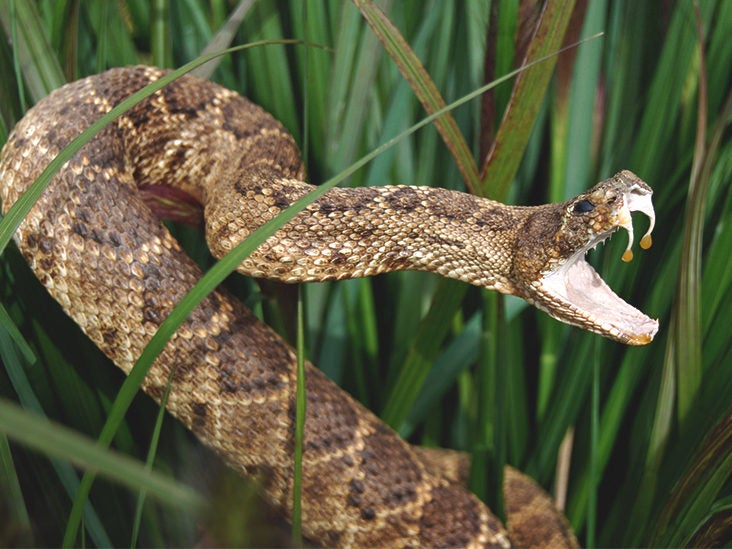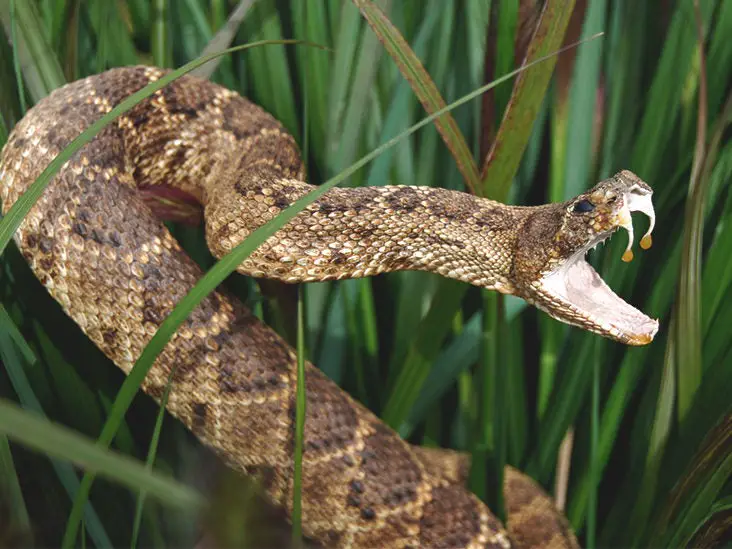Rattlesnakes are infamous for their venomous bite. While not all rattlesnake bites are fatal, they can still cause serious harm to humans. If you’re ever bitten by a rattlesnake, it’s important to know what to do next. In this article, we’ll explore the symptoms of a rattlesnake bite, how to treat it, and what steps you can take to prevent getting bitten in the first place. So, buckle up and get ready to learn what happens when you get bit by a rattlesnake!
If you get bitten by a rattlesnake, seek immediate medical attention. Do not try to suck out the venom, use a tourniquet, or apply ice to the bite. Keep the affected limb immobilized and lower than your heart. Antivenom is the most effective treatment for rattlesnake bites, and it should be administered as soon as possible by a healthcare professional.

What Happens if You Get Bit by a Rattlesnake?
Rattlesnakes are venomous snakes that can be found in many regions of the world, including North and South America. While they are typically not aggressive, they will bite in self-defense if they feel threatened. If you are bitten by a rattlesnake, it is important to know what to expect so that you can seek medical attention immediately.
Symptoms of a Rattlesnake Bite
When a rattlesnake bites, it injects venom into the body, which can cause a range of symptoms, including:
- Pain and swelling at the bite site
- Redness and bruising
- Nausea and vomiting
- Weakness and dizziness
- Difficulty breathing
- Changes in heart rate and blood pressure
In severe cases, a rattlesnake bite can even be fatal. It is important to seek medical attention immediately if you are bitten by a rattlesnake.
What to Do if You Are Bitten by a Rattlesnake
If you are bitten by a rattlesnake, it is important to take the following steps:
- Stay calm and still. Moving can cause the venom to spread more quickly through your body.
- Remove any tight clothing or jewelry near the bite site.
- Keep the affected limb elevated.
- Seek medical attention immediately. Do not attempt to treat the bite yourself.
At the hospital, you will likely receive antivenom to counteract the effects of the venom. You may also receive pain medication and other treatments to manage your symptoms.
Preventing Rattlesnake Bites
While there is no surefire way to prevent rattlesnake bites, there are a few things you can do to reduce your risk:
- Wear protective clothing when hiking or working outdoors.
- Stay on designated trails and avoid walking in tall grass or brush.
- Be aware of your surroundings and watch for signs of snakes.
- Avoid handling or provoking snakes.
If you live in an area where rattlesnakes are common, you may also want to consider taking precautions such as installing snake-proof fencing around your property.
Conclusion
In conclusion, if you are bitten by a rattlesnake, it is important to seek medical attention immediately. Knowing the symptoms of a rattlesnake bite and how to prevent them can also help reduce your risk of being bitten in the first place. Stay safe and be aware of your surroundings when you are outdoors in rattlesnake territory.
Frequently Asked Questions
What are the symptoms of a rattlesnake bite?
When bitten by a rattlesnake, the first symptoms that appear are usually pain, swelling, and redness at the site of the bite. The bitten area may also feel warm or have a tingling sensation. As the venom spreads, symptoms can progress to nausea, vomiting, weakness, and difficulty breathing. These symptoms can be life-threatening if left untreated.
What should I do if I get bitten by a rattlesnake?
If you are bitten by a rattlesnake, it is important to seek medical attention immediately. Try to keep the affected limb immobilized and below heart level to slow the spread of venom. Do not try to suck out the venom or use a tourniquet, as these methods can be dangerous and may worsen the situation. Call for emergency help and get to a hospital as soon as possible.
How is a rattlesnake bite treated?
Treatment for a rattlesnake bite typically involves administering antivenom, which is a serum made from antibodies that neutralize snake venom. The antivenom is given intravenously and may need to be repeated several times depending on the severity of the bite. Pain relievers and other supportive care may also be provided to manage symptoms and prevent complications.
What are the long-term effects of a rattlesnake bite?
In some cases, a rattlesnake bite can cause long-term complications such as nerve damage, tissue loss, and scarring. If the venom affects major organs such as the heart or lungs, it can also lead to permanent damage or even death. It is important to receive prompt medical attention to minimize the risk of these complications.
How can I prevent getting bitten by a rattlesnake?
To prevent getting bitten by a rattlesnake, it is important to be aware of your surroundings and avoid areas where snakes may be present, such as rocky outcrops or tall grass. Wear protective clothing such as long pants and boots when hiking or working outdoors, and use caution when reaching into dark or hidden areas. If you encounter a rattlesnake, give it plenty of space and do not try to handle or provoke it.
What Happens if a Rattlesnake BITES You?
In conclusion, getting bit by a rattlesnake is a serious matter that requires immediate medical attention. The venom of a rattlesnake can cause a range of symptoms, from mild to life-threatening. It is important to stay calm and immobilize the affected area to minimize the spread of venom throughout the body.
If you are in an area where rattlesnakes are common, it is important to take precautions such as wearing appropriate footwear and staying on designated trails. If you do encounter a rattlesnake, give it plenty of space and avoid disturbing it.
Remember, prevention is key when it comes to avoiding snake bites. However, if you do get bit, seek medical attention immediately and follow the advice of healthcare professionals. With prompt treatment, most people make a full recovery from rattlesnake bites.


